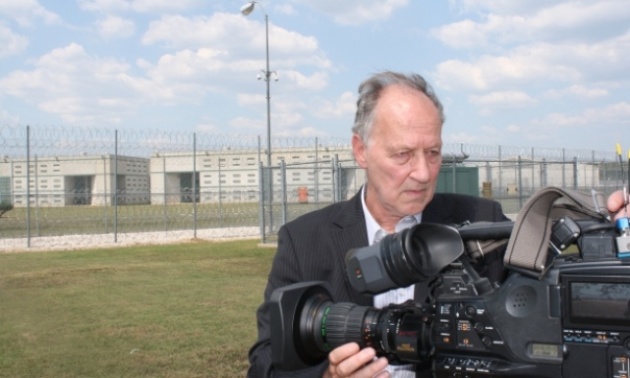
Throughout his illustrious filmmaking career Werner Herzog has explored everything the world has to offer, from the search for El Dorado in Aguirre, Wrath of God (1972) to his recent journey to the earliest known human paintings, preserved for 32,000 years in Southern France in Cave of Forgotten Dreams 3D (2010). He has always displayed a fascination with human behavior and a curiosity to discover the wonders of life on earth.
Here he continues to prove that he is one of the most prominent directors working today, by literally walking the line between life and death in this documentary, and in the process, raising the capital punishment debate to the surface once again.
Herzog is devoutly anti-capital punishment, saying from the beginning that he finds it barbaric to kill another human being. This being said, the film takes a balanced stance and shows the humanism of all parties involved, from sympathy given to victim’s families and friends to the Death Row captain, who now retired, continues to suffer from his work.
In a small town called Conroe, on the edges of Texas, 17-year-old friends Michael Perry and Jason Burkett had their eyes on a snazzy red sports car with a white soft top, belonging to a Ms. Sandra Stoler. But the rebellious dope-smoking teens, living in a trailer without their parents, couldn’t ever afford it.
Sandra was busy baking cookies when the boys broke in and shot her in the back. It was just unfortunate her son and his friend were on their way home at the time, being shot and dragged out to the woods to cover things up. But the car was awesome. The boys bragged about their spoils all over town, offering joy rides to bar maids and openly admitting they had to shoot a few folks to get it.
Ten years on and Jason is still serving life in prison. His dad is just down the hall serving life too, and his brother is in the jail next door, for possession. They spend Christmas together in the cafeteria.
Michael is just eight days away from death on Death Row. However, the now 28-year-old seems relatively calm about his impending death. Moreover, his dad has died just one week prior to Herzog’s interview. He says: ‘I’m a Christian, so as I see it, I’m either going home or I’m going home.’
Herzog says to Michael: ‘destiny has dealt you a bad deck of cards’ and it is hard to disagree with. The film presents a bleak vicious circle, where whole families are driven to senseless crime and violence, many of who are illiterate and live in poverty.
The only problem with Herzog’s film is his lack of a strong argument; he’s not adding anything to the debate that hasn’t already been said on many occasions.
He could have done as Errol Morris did in The Thin Blue Line, creating a documentary that actually investigated the case into being reviewed and set the prisoners free. But Herzog just stands back, and lets the audience be pulled into the tragedy.
One critic (Matt Goldberg of Collider.com) actually called Herzog “a tragedy vampire, sucking thedrama out of the lives of others while offering nothing in return.”
It’s hard-hitting and definitely not an easy watch, both heartbreaking seeing families who can’t let go of the past and haunting seeing Michael face his death, as well as watching the other prisoners who face a living death in prison.
But Herzog does offer some encouragement by showing a glimmer of hope in Jason’s future. His wife Melyssa, once an ‘inmate groupie’, has mysteriously become pregnant with his child through artificially inseminated sperm, smuggled out of prison. She holds her phone up to the camera, revealing an ultrasound photo of their tiny baby boy, to be named Easton.
Their future happiness and the relief of the victim’s families when Michael dies, brings Herzog’s doc to life. By transforming supposed monstrous killers into humans worthy of the audience’s respect, we are shown the real monster of the ‘justice’ system, capital punishment.



